Le Consentement (2023): the trap of literature | la trampa de la literatura
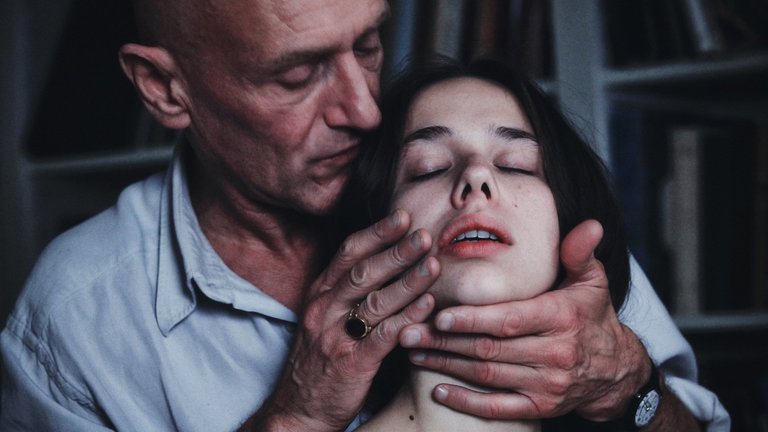
I don't know how it was for you, but since I was a child I associated France and Paris with art and love. The world capital of romance, the Eiffel Tower, the Champs Elysées, that romantic and heartbreaking French music in the voices of Edith Piaf or Jacques Brel, the Louvre, Monet, Degas, Renoir, Matisse, Delacroix, Gauguin, Sartre, de Beauvoir, the experience of the lost generation, that of the Latin American writers who made their lives in the French capital. ... all this led me to fix in my mind the idea - and the image - that Paris (and France and Europe) was the cradle of sophistication, art, class and literature.
No sé cómo haya sido para ustedes, pero desde muy chico asocié Francia y París con el arte y el amor. La capital mundial del romance, la torre Eiffel, los campos Elíseos, esa música francesa romántica y desgarradora en las voces de Edith Piaf o Jacques Brel, el Louvre, Monet, Degas, Renoir, Matisse, Delacroix, Gauguin, Sartre, de Beauvoir, la experiencia de la generación perdida, la de los escritores latinoamericanos que hicieron vida en la capital francesa... todo ello me llevó a fijar en mi menta la idea - y la imagen - de que París (y Francia y Europa) era la cuna de la sofisticación, el arte, la clase y la literatura.
However, as I have gotten to know more about the reality and history of the city, the country and its inhabitants, that image has become dirtier. The same has happened to me with other societies (Sweden, Norway, Japan, South Korea) that seem to me to be more evolved than Latin America in terms of quality of life and the supposed human values of their individuals, but it seems that this development entails in itself the degradation of certain moral values. All this introduction comes in connection with a lot of condemnable cases that occurred within French society, among which my last discovery was the “amorous” relationship between the writer Gabriel Matzneff, almost 50 years old, and his lover Vanessa, only 14 years old (!) in the eighties. This story, as valuable to show as it is uncomfortable to watch, is what is told in Le Consentement, a French film directed by Vanessa Filho and written by her together with Vanessa herself. I don't want to tell much about the plot because I prefer to concentrate on other aspects derived from it, but basically Vanessa is a teenager who likes to read and write and meets one day - by chance - Gabriel, a writer with some renown at the time, who sends her a letter confessing how enchanted he was with her. This impresses the girl, normally shy and somewhat insecure, and she answers the letter, starting an epistolary exchange between them that then leads them to furtive encounters in out-of-the-way places in the city until finally the dynamic of two lovers is established: sex, jealousy, possession, outbursts, exacerbated declarations, etc. He is forty-nine years old. She is fourteen. I'll say it again: fourteen.
Sin embargo, a medida que he ido conociendo más la realidad y la historia de la ciudad, el país y sus habitantes, esa imagen se ha ido ensuciando. Lo mismo me ha ocurrido con otras sociedades (Suecia, Noruega, Japón, Corea del Sur) que me parecen más evolucionadas que la latinoamericana en materia de calidad de vida y los supuestos valores humanos de sus individuos, pero parece ser que ese desarrollo conlleva en sí la degradación de ciertos valores morales. Toda esta introducción viene a propósito de un montón de casos condenables ocurridos en el seno de la sociedad francesa, entre los que mi último descubrimiento fue la relación "amorosa" entre el escritor Gabriel Matzneff de casi 50 años y su amante Vanessa, de tan sólo 14 (!) en la década de los ochenta. Esta historia, tan valiosa de mostrar como incómoda de ver, es lo que se cuenta en Le Consentement, película francesa dirigida por Vanessa Filho y escrita por ella junto a la propia Vanessa. No quiero contar mucho de la trama porque prefiero concentrarme en otros aspectos derivados de ella, pero básicamente Vanessa es una adolescente a la que le gusta leer y escribir y conoce un día - de casualidad - a Gabriel, un escritor con algo de renombre en el momento, quien le envía una carta confesando cuán encantado quedó con ella. Esto impresiona a la chica, normalmente tímida y algo insegura, y responde la carta, dando inicio a un intercambio epistolar entre ellos que luego los lleva a encuentros furtivos en lugares apartados de la ciudad hasta que finalmente se establece la dinámica de dos amantes: sexo, celos, posesión, arrebatos, declaraciones exacerbadas, etc. Él tiene cuarenta y nueve años. Ella catorce. Lo diré de nuevo: catorce.
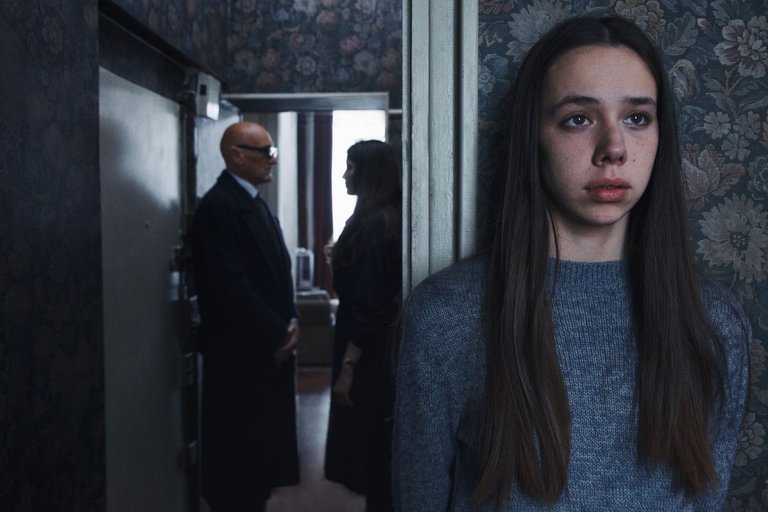
The most horrible and uncomfortable thing is perhaps not the fact of how Gabriel takes advantage of Vanessa's innocence and inexperience, which in itself is tremendously shocking, but - in my opinion - the fact that their relationship is public. I can understand that Vanessa, being so young, with a broken relationship with her mother and an absent father, felt attracted (or confused) by the attention received from Gabriel, an admired and adult man. I can also understand - never justify or support - the moral deviation that pushed Gabriel to write that letter to Vanessa and to want to be close to her. Up to there everything comes to be, with Nabokov's permission, a sort of Lolita, à la française.
Lo más horrible e incómodo quizás no sea el hecho de cómo Gabriel se aprovecha de la inocencia e inexperiencia de Vanessa, lo que ya de por sí es tremendamente estremecedor, sino - en mi opinión - el hecho de que su relación sea pública. Puedo entender que Vanessa, siendo tan joven, con una relación quebrada con su madre y con un padre ausente, se haya sentido atraída (o confundida) por la atención recibida de Gabriel, un hombre admirado y adulto. Puedo entender también - nunca justificar ni apoyar - la desviación moral que empujó a Gabriel a escribirle esa carta a Vanessa y a querer estar cerca de ella. Hasta allí todo viene a ser, con el permiso de Nabokov, una especie de Lolita, à la française.
A lot of things happen in the 137 minutes of the movie, there's a central plot, conflicts, main and secondary characters, etc., but I don't want to give more details about that so that you can discover it for yourselves - hopefully in a movie theater - and also because I think that what happens is not the most relevant part of the story. If you are one of those who like to watch movies to be entertained and have fun, Mickey 17 may please you because there are action sequences, moments of irony, explosions, some romance, political, social satires and several moments where the actions provoke laughter, thanks to Bong Joon-ho's sense of humor, which we already saw in previous works such as Okja. But underneath that appearance, underneath the things that happen, there are much deeper dramas and themes. For example, despite the fact that every time he dies, Mickey has his memories re-implanted and in theory becomes himself again - because also physically his DNA is 100% cloned - not all Mickeys are the same. Some have been more noble, others more aggressive, etc., and that leads us to ask ourselves, what makes us us? If we could clone ourselves and there were two bodies exactly alike and the memory of the lived experiences of both specimens were exactly the same, where would the difference between the two come from? On the other hand, is a human clone less human than a normal person? In that of using Mickey in the name of science and making it his job to die, isn't there something morally reprehensible? Because yes, okay, he gets imprinted again, but Mickey must face death over and over again.
Pero lo que no puedo entender es cómo Gabriel podía llevar a Vanessa a cenas y eventos con amigos suyos que sabían de sus gustos y que trataban a la niña como si no fuera tal, sin escandalizarse, denunciar o realizar ningún tipo de comentario a Gabriel, ¿acaso porque era escritor? ¿o todos ellos eran tan perversos como su amigo? Aún más, ¿por qué la mamá de Vanessa no fue a la policía? ¿por qué no fue más dura con la prohibición a su hija de verse con este hombre? En la película se hace una referencia a la novela El amante de la escritora francesa Marguerite Duras, otra relación amorosa entre una adolescente y un hombre adulto, aunque la brecha es mucho menor, ¿estaba normalizado esto?; también hay referencias a las y los amantes adolescentes de Gabriel antes de Vanessa, no porque alguien los haya descubierto sino porque el propio Gabriel lo cuenta en sus libros. Lo diré más claro: en sus novelas, Gabriel Matzneff confesó su pedofilia, turismo sexual infantil y experiencias que tuvo con niños y niñas. La propia Vanessa está retratada en uno de sus libros. Matzneff es un escritor auto referencial y todo el mundo lo sabe y lo sabía entonces cuando abusaba sexualmente de Vanessa (por más que la niña quisiera estar con él y ser su musa y su amante), pero nadie se escandalizó, o al menos no lo suficiente. Para colmo, a pesar de esta conducta, Matzneff ganó importantes premios de escritura en Francia en 1987, 2009, 2013 y 2015. No ha estado ni un solo día en prisión. Entonces, ¿puede servir la literatura para enmascarar semejante bajeza? Si Agatha Christie hubiera cometido los crímenes narrados en sus novelas y lo hubiera confesado, ¿habría podido seguir escribiendo en libertad? ¿dónde se traza la línea de lo permitido?
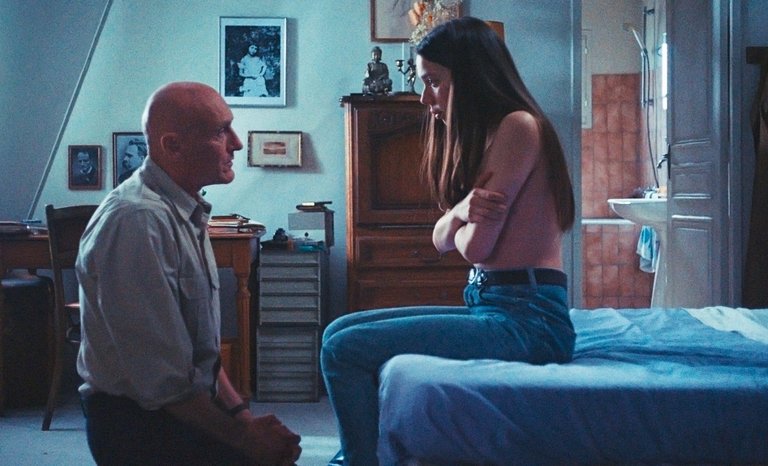
How could Gabriel's friends attend so many of his get-togethers and not be uncomfortable with the presence of the current nymphet? Because of course Gabriel had more adolescent lovers, before and after Vanessa, and they all paraded in his social circle, silent accomplices of such depravity. Putting life in books and nourishing literature with personal experiences is not what is wrong, the trap is not having written a novel about his "relationship" with Vanessa, the trap was the relationship itself and having wanted to normalize it by dressing it up as a book.
¿Cómo pudieron los amigos de Gabriel asistir a tantas de sus tertulias y no incomodarse con la presencia de la nínfula de turno? Porque por supuesto que Gabriel tuvo más amantes adolescentes, antes y después de Vanessa, y todas desfilaron en su círculo social, cómplices silenciosos de semejante depravación. Poner vida en los libros y nutrir la literatura de experiencias personales no es lo que está mal, la trampa no es haber escrito una novela sobre su "relación" con Vanessa, la trampa fue la relación en sí y haber querido normalizarla al vestirla de libro.
Immortal, trapped in the pages of Gabriel's novel, Vanessa got what her innocent heart wanted: to be the muse of a respected (not respectable) writer, but that image, distorted, public and humiliated, brought her serious consequences and disorders that took her many years to overcome. However, the same trap revealed her liberation. If Gabriel had engraved on the world the image of the fourteen-year-old girl she had been, then she would portray in a book who the infamous writer Gabriel Matzneff really was. That book, Le Consentement, was published in 2020 and caused a stir in French society which was now shocked by the story and because Matzneff was close to personalities such as François Mitterrand, Jean-Marie Le Pen, Yves Saint Laurent and his partner Pierre Bergé. However, Matzneff was never prosecuted and today, at the age of 88, he still lives in France. One of the things that reassured me after watching the film was to discover that Kim Higelin, the actress who plays Vanessa, is actually 25 years old (she was born in 2000) so at least the film did not replicate the pedophilia of the true story already repeated in Matzneff's novel. However, Higelin is convincing as a teenager and that makes the sexual scenes - which are quite graphic - very uncomfortable to watch. Le Consentement is the good movie of a murky story about the darker side of a society reflected in an individual. I don't know if any of you have seen this movie and although I would like to read some of your opinions about Vanessa's case, I don't know if I would recommend it because it can be very shocking, would you watch it?
Inmortal, atrapada en las páginas de la novela de Gabriel, Vanessa consiguió lo que su inocente corazón quería: ser la musa de un escritor respetado (no respetable), pero esa imagen, desvirtuada, pública y humillada, le trajo graves consecuencias y trastornos que le tomó muchos años superar. Sin embargo, la misma trampa le reveló su liberación. Si Gabriel había grabado en el mundo la imagen de la niña de catorce años que ella había sido, entonces ella retrataría en un libro quién fue verdaderamente el infamemente célebre escritor Gabriel Matzneff. Ese libro, Le Consentement, se publicó en 2020 y causó revuelo en la sociedad francesa que ahora quedó en shock por la historia y porque Matzneff era cercano a personalidades como François Mitterrand, Jean-Marie Le Pen, Yves Saint Laurent y su socio Pierre Bergé. Sin embargo, Matzneff nunca fue procesado y hoy, a sus 88 años, aún vive en Francia. Una de las cosas que me tranquilizó después de ver la película fue descubrir que Kim Higelin, la actriz que encarna a Vanessa, en realidad tiene 25 años (nació en el año 2000) con lo que al menos la película no replicó la pedofilia de la historia real ya repetida en la novela de Matzneff. Sin embargo, Higelin resulta convincente como adolescente y eso hace que las escenas sexuales - que son bastante gráficas - sean muy incómodas de ver. Le Consentement es la buena película de una historia turbia sobre el lado más oscuro de una sociedad reflejada en un individuo. No sé si alguno de ustedes ha visto esta película y aunque me gustaría leer algunas de sus opiniones sobre el caso de Vanessa, no sé si recomendarla porque puede ser muy chocante, ¿ustdes la verían?
Reviewed by | Reseñado por @cristiancaicedo
Other posts that may interest you | Otros posts que pueden interesarte:
  |
|---|
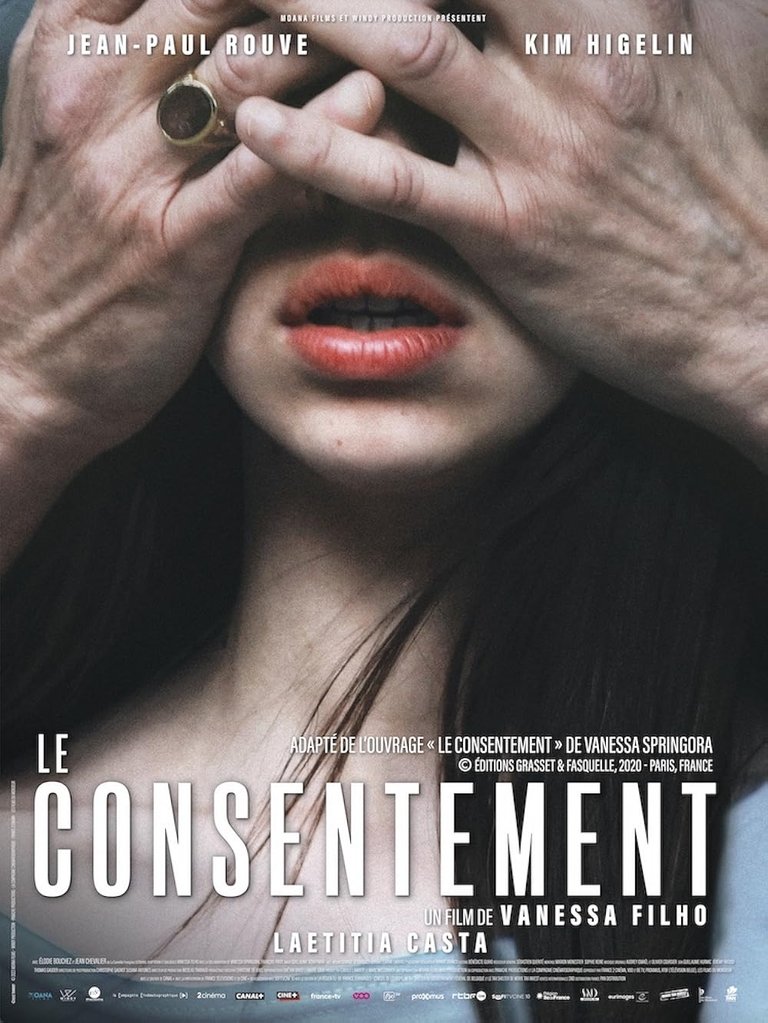

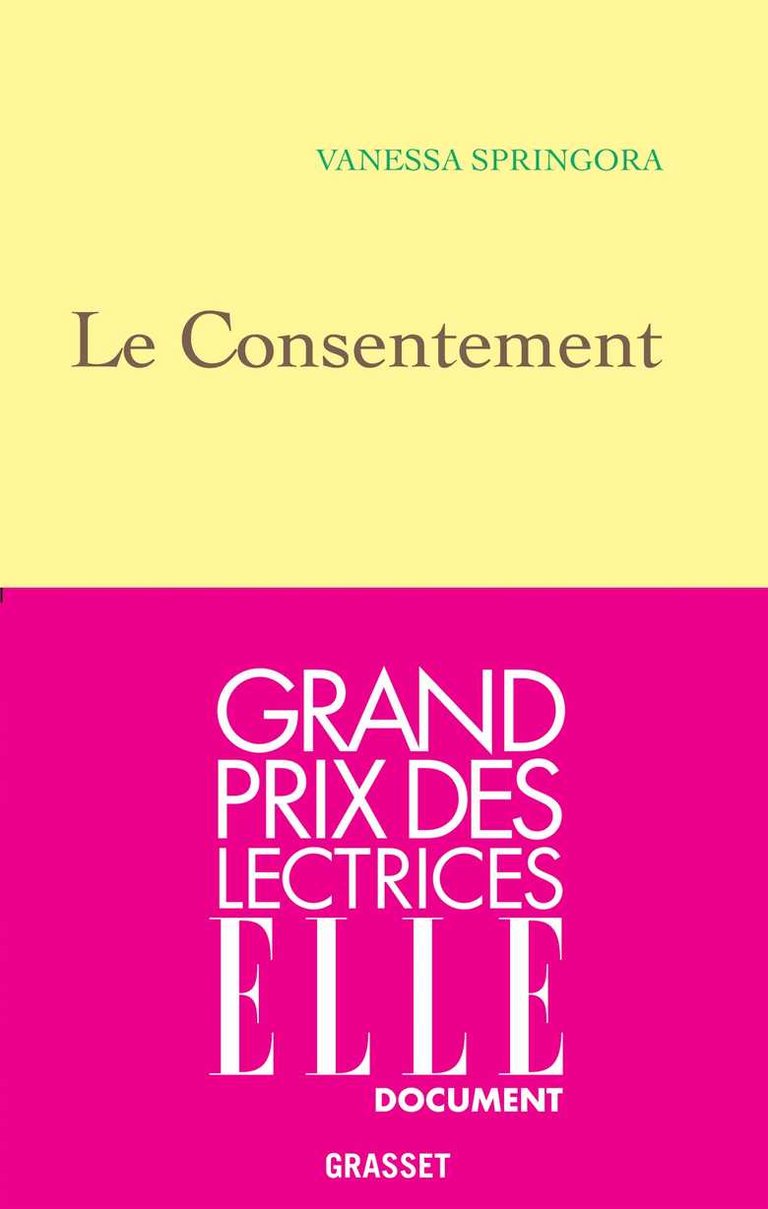

A kind of Lolita interesting, i must watch it surely its quite controversial.
Yes, it's controversial. Thank you for reading my post
Sinceramente no podría ver una película de este tipo, mis valores morales me lo impiden, caso igual que no he podido ver ninguna de esas películas de culto donde la dinámica es parecida. Creo que sentiría asco por lo que estaría viendo y prefiero ahorrarme la experiencia.
Es cierto, algunas películas o escenas puede producirnos malestar físico (y psicológico), así que es perfectamente comprensible que no quieras exponerte a ellos. De igual forma muchas gracias por leer mi post. Saludos.
¡Felicitaciones!
1. Invierte en el PROYECTO ENTROPÍA y recibe ganancias semanalmente. Entra aquí para más información.
3. Suscríbete a nuestra COMUNIDAD, apoya al trail de @Entropia y así podrás ganar recompensas de curación de forma automática. Entra aquí para más información sobre nuestro trail.
4. Creación de cuentas nuevas de Hive aquí.
5. Visita nuestro canal de Youtube.
Atentamente
El equipo de curación del PROYECTO ENTROPÍA
Muchas gracias por el apoyo!
Excelente reseña, aunque luce muy interesante no podría ver una película como está, simplemente no podría
Es comprensible debido al tema que trata. Muchas gracias por leerme.
Definitivamente, controversial, pero, no somos neutrales ante tantos conflictos y situaciones que vivimos a diario, por eso pienso que hay que conocer, estar alerta, hacer algo; no obviar...
Gracias por darnos esta reseña.
No la conocía, @cristiancaicedo
Gracias a ti por leer mi reseña @emiliorios Saludos
se ve interesante, buen post!
looks interesting, good post!